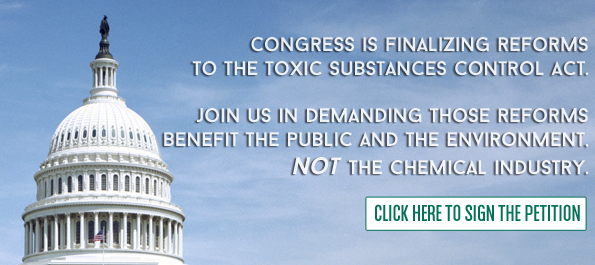Right now, Congress is in the final stretch of deliberation over legislation that will decide the future of our national chemical regulation – and we need to take this opportunity to have our voices heard.
In 1976, after years of unfettered environmental degradation, and skyrocketing chronic diseases, learning disabilities, and other health issues, Congress passed the Toxic Substances Control Act (TSCA) to authorize the Environmental Protection Agency to regulate chemicals used in U.S. commerce.
And, it hasn’t been updated since.
Not only that, TSCA is widely regarded to have been doomed from the start, given the EPA’s lack of power to effectively regulate dangerous chemicals such as lead, formaldehyde and asbestos. The current law requires the EPA to prove a chemical causes an “unreasonable risk” to human health and the environment, and that the agency would regulate the substance in the “least burdensome” way; what this looks like in reality is detailed in the case of asbestos, where the EPA spent ten years developing its proposed regulation only to be overturned in court once completed.[1]
It has been difficult – if not impossible, until recently – to make significant reforms at the federal level because of the strong grip of the chemical industry, and their big tobacco inspired tactics. The American Chemistry Council has led some of the biggest chemical corporations in drafting legislation, crying wolf that stricter regulations cost jobs and growth, manipulating data and science, and spending hundreds of millions of dollars to stifle any state or federal legislation[2]. The industry is now speaking up in favor of TSCA reform…in large part because their greater fear is continued strong state legislation.[3] An analysis from Environmental Working Group showed that the chemical industry has spent over $221 million lobbying Congress on TSCA.[4]
In the absence of effective federal regulation, states like Vermont have taken action to protect their citizens. The good news is that these regulations are working! A great example of effective state regulation can be found in California where they were able to show an almost 40% drop in the presence of the toxic flame retardants in women’s bodies after banning these chemicals a decade ago. [5] Here in Vermont we have also banned toxic flame retardants, as well as BPA in baby bottles, and this year we will be requiring manufacturers of children’s products to report exactly what products they produce contain known toxic chemicals. The next step will be getting more of these toxic chemicals off the store shelves, but we need to make sure our hands are not tied by special interests in Washington.
Congress is now finalizing TSCA reform, currently working to bridge the different House and Senate versions of the Udall-Vitter chemical bill that passed last year. While both bills contain significant reforms granting the EPA greater power to test and regulate chemicals, there are also unfortunate provisions included that would roll back progress for the sake of special interest groups[6]. The Senate bill, for example, would make it harder for the EPA to restrict chemicals in products being imported from overseas. The bill would also roll back the right of states to address the needs of their citizens and prevent them from taking action, even in the face of years of delay from the EPA[7].
VPIRG has joined a broad coalition of public health, environmental, labor, business, faith and civil rights organizations – as well as hundreds of thousands of activists – to ensure these two bills are reconciled to be in the best interest of public and environmental health, not the chemical industry. Now, we need you to add your voice.
Our national partners at Safer Chemicals, Healthy Families are collecting signatures to send to House and Senate leadership and to the Committee leadership that will be reconciling the bills, demanding that the final reform:
• Remove the legal barriers that currently prevent EPA from testing, reviewing, and – when necessary- restricting a chemical to ensure safety.
• Expedite EPA action on persistent and bio-accumulative chemicals (“PBTs”).
• Preserve the ability of states to protect their citizens.
• End the abuse of provisions for confidential business information.
• Require EPA to make steady progress every year.
• Ensure EPA has the resources it needs.
• Not weaken any current EPA authority (such as regulation of imported products)
With the news concerning the Flint, Michigan water crisis, and most recently the discovery of PFOA-contaminated water in North Bennington, Vermont, the need to protect all Americans from toxic chemicals is all the more urgent and apparent[8]. In order to prevent more of these tragedies, we need to pass real reform-and in order to do that, we need you.
Please take a minute to sign the Safer Chemicals, Healthy Families petition here.
[1]http://www.slate.com/articles/news_and_politics/politics/2015/09/methylene_chloride_is_a_deadly_chemical_found_in_paint_thinners_why_has.html
[2] http://www.publicintegrity.org/2016/02/08/19223/meet-rented-white-coats-who-defend-toxic-chemicals
[3] http://www.nytimes.com/2015/03/07/us/tom-udalls-unlikely-alliance-with-the-chemical-industry.html?_r=2
[4] http://www.ewg.org/enviroblog/2016/03/chemical-giants-spend-55-million-weaken-toxic-chemicals-law
[5] http://www.ewg.org/enviroblog/2016/03/ten-years-after-state-s-ban-big-drop-fire-retardants-california-breast-milk
[6] http://saferchemicals.org/2015/12/18/tsca-reform-the-most-important-work-comes-next/
[7] http://saferchemicals.org/2016/01/22/state-leaders-express-new-concerns-about-chemical-reform/

